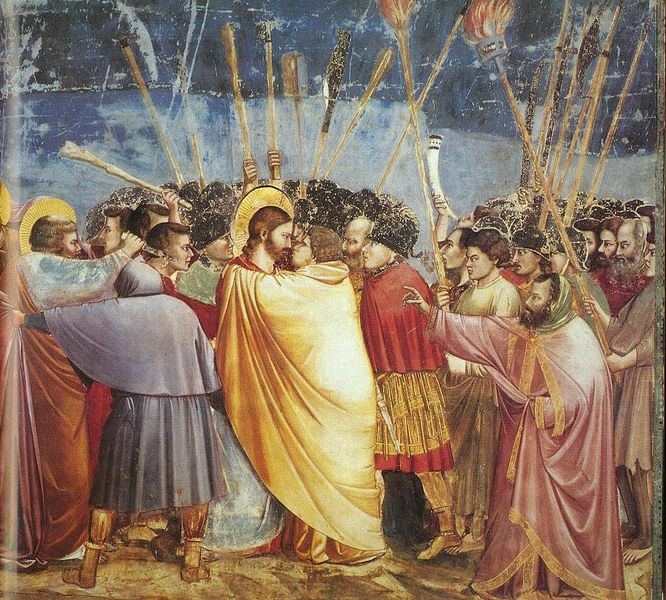 When Judas approached Jesus in the Garden and kissed him, how do you think Jesus responded? Oh, we know what the gospel says:
When Judas approached Jesus in the Garden and kissed him, how do you think Jesus responded? Oh, we know what the gospel says:
While Jesus was still speaking, Judas…arrived; with him was a large crowd with swords and clubs, from the chief priests and the elders of the people. Now the betrayer had given them a sign, saying, ‘The one I will kiss is the man; arrest him.’ At once he came up to Jesus and said, ‘Greetings, Rabbi!’ and kissed him. Jesus said to him, ‘Friend, do what you are here to do.’ (Matthew 26:47-50
So Jesus responds by calling Judas “Friend.” (In every Bible translation I’ve seen, Jesus calls Judas “Friend” here.)
But I’d never thought much about what this might imply until I watched the extraordinary performance of Bach’s St. Matthew Passion by the Berliner Philharmoniker*. What’s extraordinary is that the singers act out the words they’re singing. No, it’s more than that: their singing, their acting, swells up from deep in their beings. The brilliant stage director Peter Sellars has encouraged all the singers to sink profoundly into the characters they’re portraying. Bach’s setting of the Passion already does this, so Sellars is really just giving the performers permission to make visual what the music already enacts.
The Evangelist’s part is uniquely challenging, since Sellars has him enact all the text he’s singing—so he’s playing many parts as they arise, including that of Jesus. (The few lines of the Passion narrative that the Gospel gives to Jesus are sung by a baritone standing on a balcony above the singers and musicians on the stage. This splitting of Jesus’s role into two singers dramatizes Jesus’s two natures, divine and human.)
The entire performance is gripping. But a particular moment especially grabs me. Picture this: With the words “At once he came up to Jesus and said, ‘Greetings, Rabbi!’ and kissed him,” Judas leans toward the Evangelist and kisses him on the lips. The Evangelist, as Jesus, leans into the kiss—which is prolonged, in silence.
Mark Padmore, who sings the Evangelist in this performance, talks about this striking moment in aninterview with Sellars*:
It’s a great challenge, because Judas has been portrayed as a scapegoat. He has been blamed, accused, made the reason for anti-Semitism. It is a terrible history, one that we do have to address. We can’t blithely paint a picture that this is some criminal who we don’t care about. That’s so not what Bach does, throughout the whole piece.
And of course one of the big moments is the Judas kiss. In this performance we try to give it its significance—a space and a length of time that it takes. And it becomes something that is not just given, but it’s reciprocated. Judas comes to give a sign of a betrayal; Jesus turns it around to give a sign of love.
I think the uncomfortable nature of [the kiss]—that it disturbs and makes the audience feel a bit on edge—is a measure of it being taken seriously and thought about. I think we need these moments to reassess our stereotypes of characters, particularly in a story that we know so well, or think we know well.
“Judas comes to give a sign of a betrayal; Jesus turns it around to give a sign of love.” This moment—and the performance’s image of it in the kiss returned—has been my Holy Week meditation.
For this is the heart of the Christian story. We betray God; God responds with love. We betray God; God responds with love. We betray God; God responds with love.
We betray God whenever we demean or demonize another person, since that person is made in God’s image; yet God responds to us with love. I betray God when I snap at my husband; my snapping is like slapping God in the face. Yet God responds by embracing me in a forgiving hug. (“Get rid of all bitterness, all passion and anger, harsh words, slander, and malice of every kind. In place of these, be kind to one another, compassionate, and mutually forgiving, just as God has forgiven you in Christ”— Ephesians 4:31-32.)
I betray God when I don’t give thanks for the food on my table, since it comes from God’s abundance; yet God responds by showering me with riches. (“All you who are thirsty, come to the water! You who have no money, come, receive grain and eat! Come, without paying and without cost, drink wine and milk!… Heed me, and you shall eat well, you shall delight in rich fare”—Isaiah 55:1-2.)
I betray God when I see others as my enemy, because “in Christ Jesus, you who once were far off have been brought near through the blood of Christ. It is he who is our peace, who made the two of us one by breaking down the barrier of hostility that kept us apart.” (Ephesians 2:13-14)
I betray God when… But you can fill in the blank. However you fill it, God responds with love.
Judas stands on the stage, leaning into the kiss that Jesus is returning. But of course this kiss is not between two men; it’s the kiss of God with humankind. We’re reminded of this by the figure of Jesus standing in the balcony above the human drama below. It’s a profoundly theological moment: God as both human and divine, the Divine offering love through the press of human lips.
In my imagination, I stand on the stage in Judas’s place. I lean forward to kiss Jesus on the lips. I can feel him kissing me back, feel the strength of his forgiving kiss ripple through my being. We hold the kiss…forever.
* St. Matthew Passion is available on DVD or, for a small price, at https://www.digitalconcerthall.com/concert/16913?a=youtube&c=true. The Mark Padmore interview is available at http://static.digitalconcerthall.com/en/interview/16913-4.
Peggy Rosenthal is director of Poetry Retreats and writes widely on poetry as a spiritual resource. Her books include Praying through Poetry: Hope for Violent Times (Franciscan Media), and The Poets’ Jesus (Oxford). See Amazon for full list. She also teaches an online course, “Poetry as a Spiritual Practice,” through Image’s Glen Online program.
Painting above: Giotto’s Kiss of Judas.











